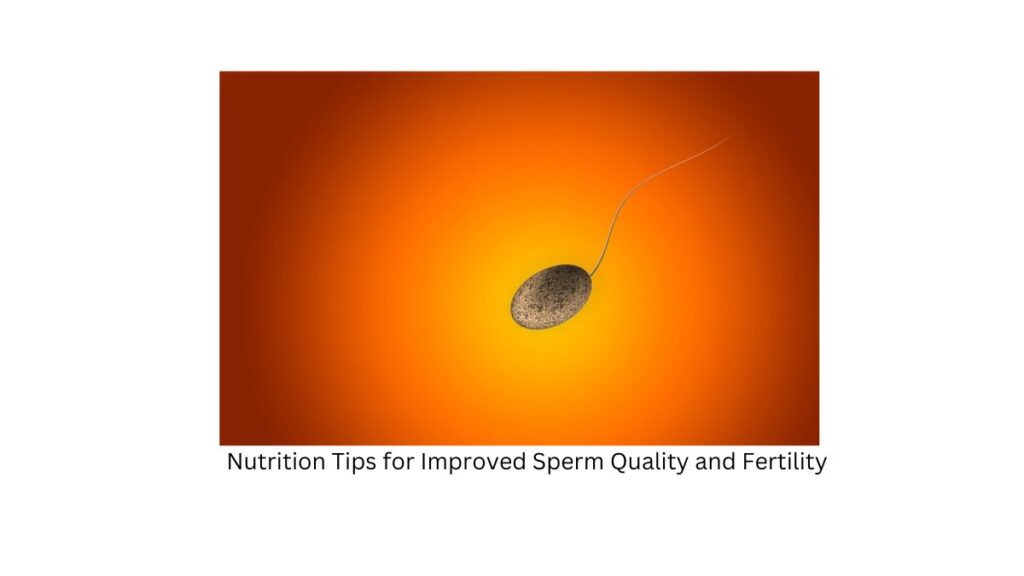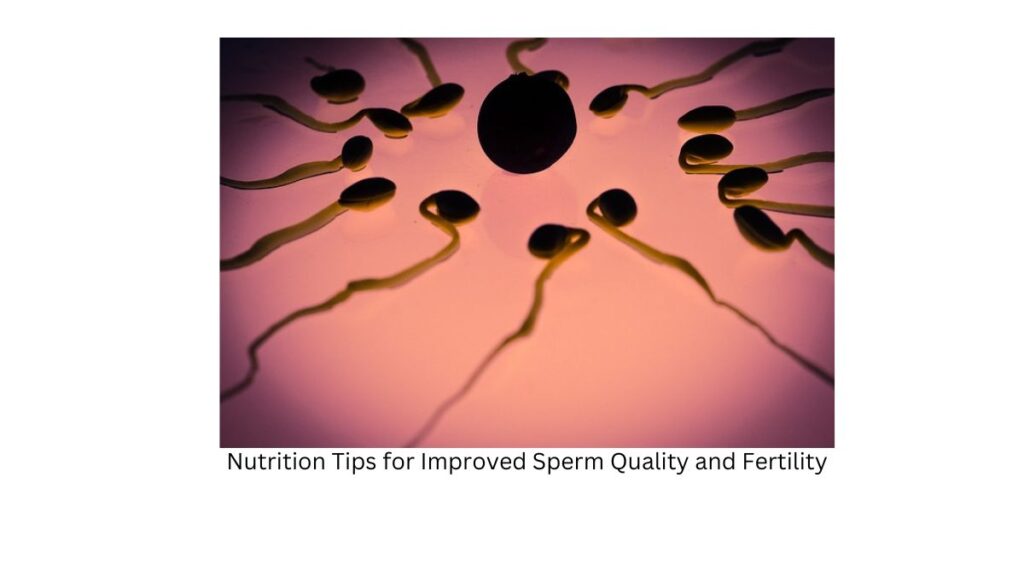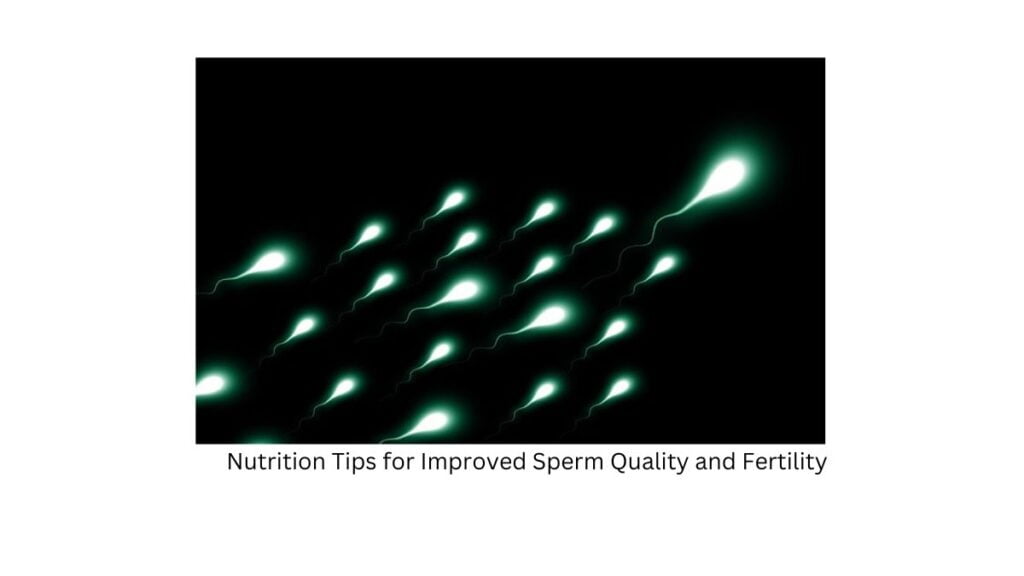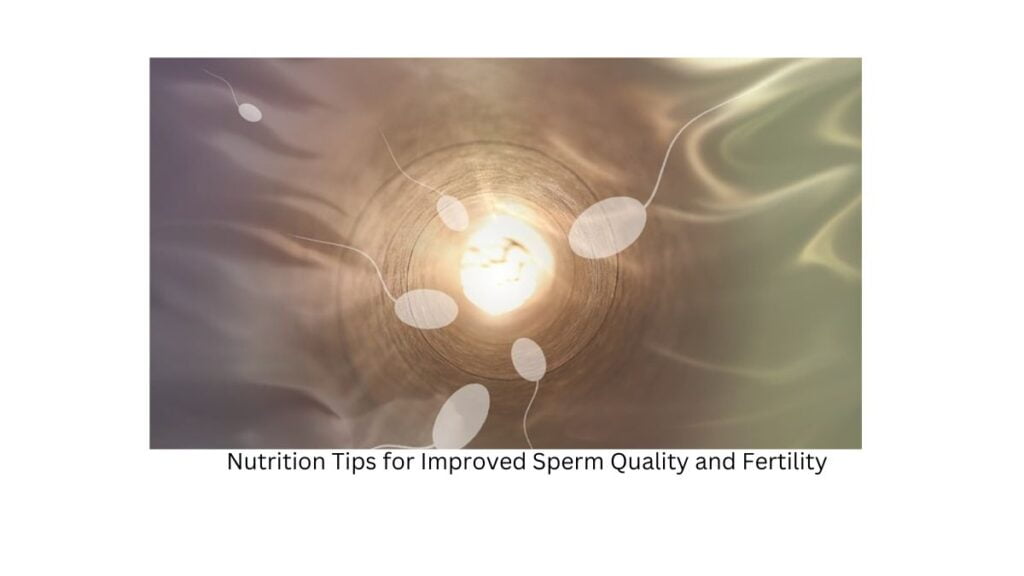Introduction:-
Nutrition Tips for Improved Sperm Quality and Fertility

In the realm of reproductive health, the role of nutrition should never be underestimated. Many factors influence sperm quality and fertility, and a balanced diet plays a pivotal role in optimizing male reproductive health. In this article, we will explore essential nutrition tips that can enhance sperm quality and increase fertility in men.
What are some essential nutrition tips that can help enhance sperm quality and increase fertility in men?

Antioxidants are your best allies in the battle for healthy sperm. Foods rich in antioxidants, such as fruits, vegetables, and nuts, help combat oxidative stress and reduce damage to sperm DNA. Incorporating a variety of colorful produce into your diet can make a significant difference.
2. Healthy Fats for Hormone Balance
A diet rich in healthy fats, like those found in avocados, nuts, and fatty fish, can support hormone production. Hormonal balance is vital for proper sperm development and function. Omega-3 fatty acids, in particular, are known to enhance sperm motility.
3. Vitamins and Minerals Matter
Certain vitamins and minerals are linked to improved sperm quality. For example, vitamin C and E are known to boost sperm motility, while zinc is essential for sperm production. Ensure your diet includes foods like citrus fruits, nuts, seeds, and lean meats to meet your nutritional needs.
4. Protein and Amino Acids
Protein is the building block of life, and it’s no different for sperm. Consuming adequate high-quality protein sources, such as lean meats, fish, and legumes, provides the essential amino acids required for robust sperm production and motility.
5. Folate for DNA Health
Folate, also known as vitamin B9, is essential for maintaining the integrity of sperm DNA. Leafy greens, lentils, and fortified cereals are excellent sources of folate that should be included in your diet.
6. Hydration is Key
Staying well-hydrated is often overlooked but critical for sperm health. Proper hydration helps maintain semen volume and overall sperm concentration.
7. Limiting Harmful Substances
Excessive alcohol consumption, smoking, and the use of recreational drugs can harm sperm quality and fertility. It’s advisable to minimize or eliminate these substances from your lifestyle.
8. A Balanced Diet is Essential
A balanced diet that provides all the necessary nutrients is crucial for optimal sperm quality and fertility. Strive for a variety of foods, whole grains, lean proteins, and plenty of fruits and vegetables.
9. Weight Management
Maintaining a healthy body weight is also vital for fertility. Both obesity and being underweight can negatively impact sperm quality and reproductive health. Aim for a healthy weight through diet and exercise.
10. Timing Matters
Sperm production is an ongoing process, so it’s essential to maintain a consistent, healthy diet over time. Don’t expect immediate results, as it may take several months for dietary improvements to manifest in sperm quality.
Which drinks increase sperm?
Certain drinks and beverages may have a positive or negative impact on sperm health. It’s important to remember that overall lifestyle factors, including diet, exercise, and avoiding harmful habits, also play a significant role in sperm quality. Here are some drinks and beverages that can have an effect on sperm health:

1. Water: Staying well-hydrated is crucial for overall health, including sperm health. Proper hydration helps maintain semen volume and sperm concentration. Dehydration can lead to a decrease in semen production.
2. Fruit and Vegetable Juices: Freshly squeezed fruit and vegetable juices, especially those rich in antioxidants like pomegranate juice, may have a positive impact on sperm quality. Pomegranate juice, for instance, has been studied for its potential to improve sperm motility.
3. Green Tea: Green tea is a source of antioxidants and has been associated with potential benefits for sperm quality. The antioxidants in green tea can help protect sperm from oxidative damage.
4. Herbal Teas: Some herbal teas, like ginseng and maca root tea, are believed to have positive effects on male fertility and may enhance sperm production and motility. However, scientific evidence is limited and varies.
5. Milk: Consuming milk and dairy products can provide essential nutrients like calcium and vitamin D, which may support overall health. However, excessive consumption of full-fat dairy products has been associated with a decrease in sperm count. Opting for low-fat or skim dairy products may be a better choice.
6. Alcohol: Excessive alcohol consumption can harm sperm quality. Limiting or avoiding alcohol is recommended for those concerned about their fertility. Moderate alcohol intake may not have a significant negative impact, but it’s best to consult a healthcare professional for guidance.
7. Caffeine: High caffeine consumption, typically found in excessive coffee or energy drinks, may affect sperm motility. Moderation is key, and it’s advisable not to overconsume caffeinated beverages.
8. Sugary Drinks: High sugar intake and the consumption of sugary beverages like soda have been associated with various health issues, including obesity. Obesity can negatively impact sperm quality, so it’s wise to limit or avoid sugary drinks.
9. Alcohol and Energy Drinks: Some energy drinks may contain caffeine and other stimulants that could negatively impact sperm quality. Excessive consumption of alcohol, often mixed with energy drinks, can be detrimental to fertility.
It’s important to emphasize that a balanced diet, rich in a variety of nutrients, plays a more significant role in sperm health than specific drinks alone. Maintaining a healthy lifestyle, including a well-balanced diet, regular exercise, and avoiding harmful substances, is key to promoting optimal sperm quality and overall fertility. If you have concerns about your fertility or sperm health, it’s advisable to consult with a healthcare professional or a reproductive specialist for personalized guidance and evaluation.
Is it good to do sperm extraction every day?
Sperm extraction or semen collection should not be done every day. Frequent ejaculation, such as daily sperm extraction, can have both short-term and long-term effects on sperm quality and reproductive health. Here are some considerations to keep in mind:

1. Sperm Quality: Frequent ejaculation can lead to a decrease in sperm quality. While the first ejaculation typically has the highest concentration of sperm, subsequent ejaculations may have lower sperm counts and reduced sperm motility. It’s important to allow some time for the body to replenish sperm reserves, usually a day or more.
2. Reproductive Health: Frequent ejaculation can lead to temporary fertility issues, particularly if you are trying to conceive. It’s generally recommended to abstain from ejaculation for a day or two before attempting to conceive to ensure higher sperm quality and concentration.
3. Overuse of Sperm Extraction Methods: If sperm extraction is being used for assisted reproductive techniques such as in vitro fertilization (IVF) or intrauterine insemination (IUI), it’s typically done under the guidance of a medical professional. Overusing these methods can lead to physical discomfort and may not be necessary.
4. Sexual Health: Frequent ejaculation should not replace regular sexual activity in a relationship, as maintaining a healthy and satisfying sex life is important for overall well-being.
In summary, it’s not advisable to perform sperm extraction or ejaculate every day, as this can have negative effects on sperm quality and reproductive health. If you have specific concerns about sperm extraction or semen collection, it’s best to consult with a healthcare professional or a reproductive specialist who can provide personalized guidance based on your individual circumstances and goals.
In conclusion,
Nutrition plays a fundamental role in enhancing sperm quality and fertility. By following these nutrition tips and adopting a balanced diet, you can positively influence your reproductive health. However, if you’re struggling with fertility issues, consider consulting a healthcare professional for personalized guidance and support.





